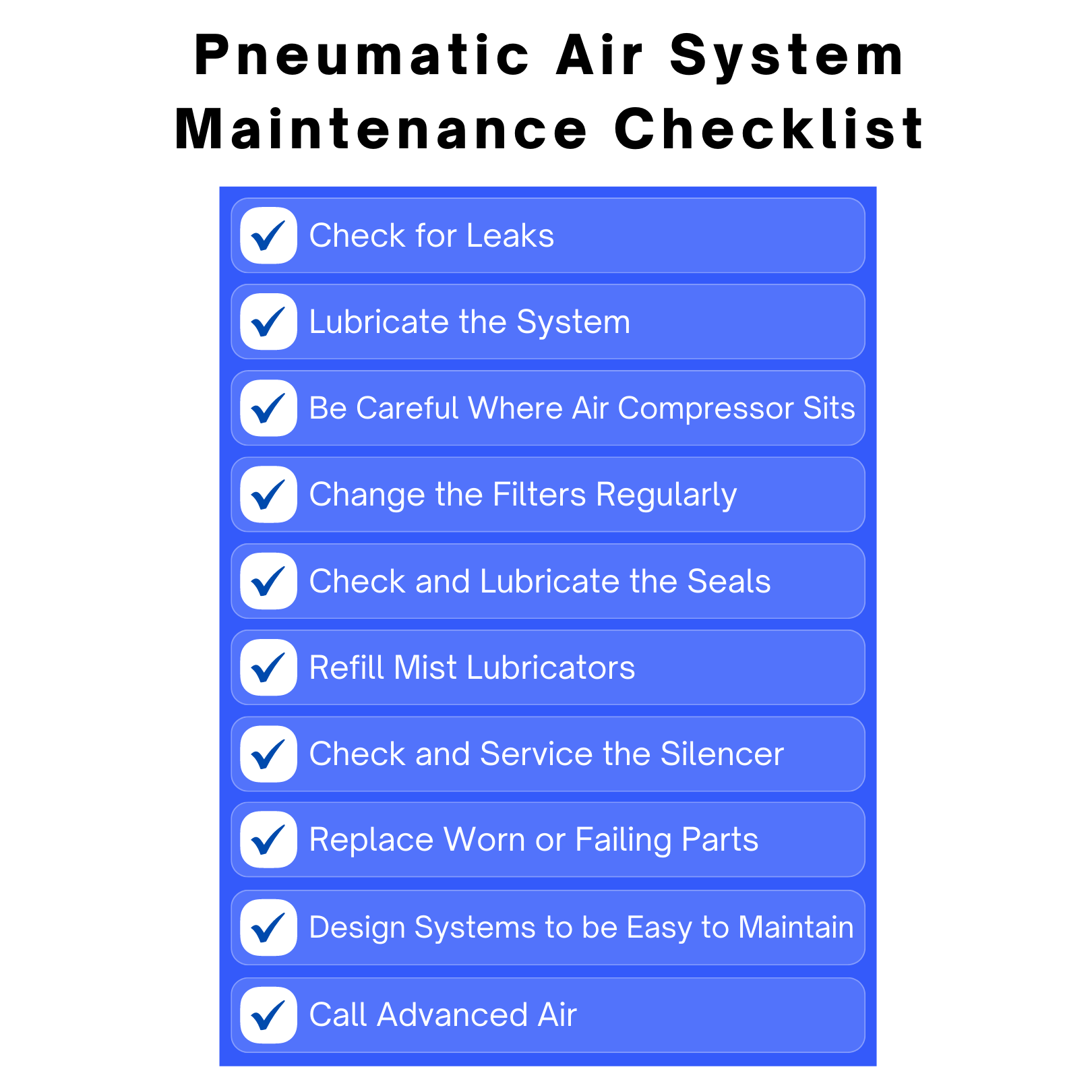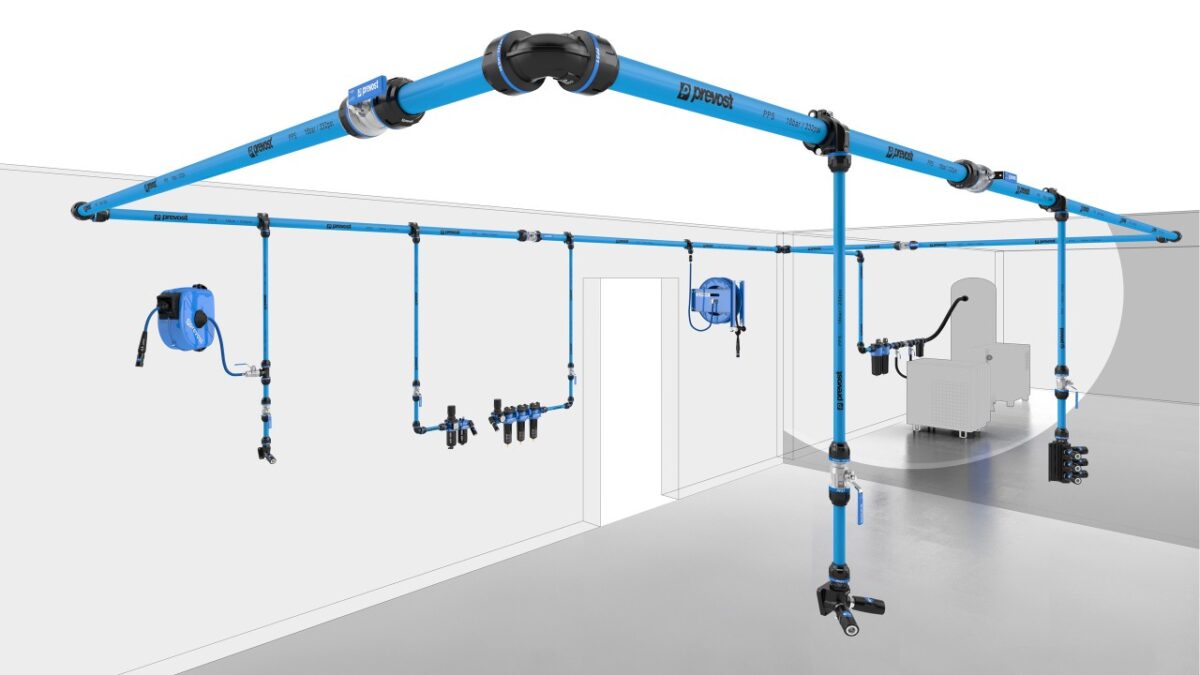Pneumatic systems need regular maintenance not only to keep working well, but to ensure that tools and accessories attached to them do not get damaged. There are several types of systems that can be based on an industrial air compressor, so the exact types and frequencies of maintenance tasks may vary. One thing that does remain constant is that pneumatic system maintenance is needed. We will provide general guidelines to give you a good starting point for keeping your system in top shape.

1. Check for Leaks
There are many potential sources of leaks and checking them all on a regular basis is one of the keys to keep your system running optimally and not overworking your air compressor. Your industrial air compressor can provide enough power to overcome the loss caused by some leaks, but even small ones will force it to cycle too often. This doesn’t just increase your energy costs, but it also shortens the life of the compressor by forcing it to work harder and more often than it should, which will create higher maintenance and repair frequencies.
You can check for air leaks in a few ways. Using soapy water to coat the outside of suspect seals, pipe joints, and especially the hoses in your compressed air piping, the soap will cause bubbles where air is escaping. In some cases, you can hear leaks. Walk around your facility near any compressed air piping and equipment, and you may hear the hiss of escaping air, if you can hear it it needs to be fixed immediately!
Another practical way to determine if leaks exist, you can shut down your system and keep an eye on the pressure gauge of the tank, if the pressure falls on the gauge when nobody is using air, the air is escaping somehow. In the case that your own leak search doesn’t reveal the culprit, call us at Advanced. We use expert methods to pinpoint which parts are leaking.
2. Lubricate the System
Air compressor pumps and motors and certain accessories need to be lubricated on a regular basis. Be sure to implement routine maintenance and follow manufacturer’s recommendation for timing and lubrication type to avoid expensive system damage.
3. Be Careful Where the Air Compressor Sits
Dust and debris will get sucked into your air compressor and trapped in the filtration so be mindful on where the air compressor are placed. Many things that are often found in these filters are dirt, pollen, dust, lint, even moisture and many more, this will cause your compressor to not work properly and require compressor maintenance more frequently.
4. Change the Filters Regularly
The system’s application will determine how often filters need to be changed. That said, it is important to change them soon enough to prevent them from becoming clogged, or worse, failing and allowing contaminants to proceed through your system.
Filters are found in many places. Look for filters in air lines, inline dryers, and for some machines even oil removing filters. If your system deals with transporting some type of product, look for filters that deal with that substance, too. The frequency of filter changes will depend on the level of contamination they have to filter out, the size of the particulate being removed, and other such factors.

5. Check and Lubricate the Seals
Check all seals regularly so that you quickly spot any that need to be replaced or lubricated. Seals wear out over time, so it’s normal to need to change them out every so often. How long this takes depends on several factors, including the sealing material and general conditions at the seal’s location. If the compressor is leaking oil it is a good indicator that a seal or gasket needs to be replaced.
6. Refill Mist Lubricators
Some systems have mist lubricators, which automatically emit a mist of lubricant onto targeted parts. Make sure these have lubricant, so nothing goes dry unexpectedly.
7. Check and Service the Silencer
Silencers get clogged over time, and when this happens, they must be cleaned or replaced. Check them on a regular basis so that you don’t find out about the problem by the arrival of abnormal operation. Silencers can be considered intake filters that are applied to the inlet side of a pump or can be considered a muffler for a purge process, like on desiccant dryers.
8. Replace Worn or Failing Parts Before They Break Down
Breakdowns happen suddenly, making them impossible to schedule for. They can also incur expensive emergency service calls. To avoid breakdowns, replace worn or suspect failing parts while you still have time to schedule the proper maintenance. This will let you either have a calm, planned downtime for the event, or even set up an air compressor rental to keep your shop running during repairs. A little maintenance spread out can make all the difference.

9. Design or Redesign Systems to be Easy to Maintain
Ease of maintenance doesn’t just save your company man-hours and reduce the level of irritation involved in keeping your system running efficiently, it is also important for ensuring that every part gets maintained appropriately. If it’s a huge hassle to get to a section of the system, that section is likely to be ignored more often than not. Then, it’ll demand attention by breaking down, forcing you to get an air compressor repair that could otherwise have been avoided.
Of course, it’s easiest to design new air systems with maintenance in mind. If you’re completing a system installation, make sure that all system components are easily accessible – including all the compressed air piping. This will do much to ensure that every part on the maintenance checklist is maintained.
If your system is already in place, go over the maintenance checklist yourself to see if it’s possible to safely reach all the components that need to be checked. You may find some parts that are so inaccessible that it’ll be worth it to go ahead and redo the layouts of those areas of your system. The investment will pay for itself by reducing component failures and increasing the efficiency and accuracy of your maintenance crew.
10. Call Advanced Air
If you need air compressor parts for standard preventive maintenance, need electric motor repair, installation or piping needs, or other advanced repairs, or you would simply rather have professional maintenance technicians handle all your air compressor service, contact us at Advanced Air at one of our three locations in North America. We have certified professionals in all aspects of an air compressor system, whether it is electrical, plumbing, installation, service or repair.

